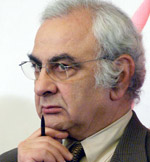Recently, American co-chairman of the OSCE Minsk Group Steven Mann said that there is still a chance to settle the Karabagh conflict in 2006. Mann added that overall, both sides have progressed and only a couple of issues remain unsolved. Yesterday, U.S. Ambassador in Azerbaijan Rino Harnish said that he is optimistic about the visit of OSCE Minsk Group co-chairmen in Washington. However, a couple of days ago, Harnish had a different opinion when he said that he doesn’t expect much from the meeting.
The U.S. Ambassador in Azerbaijan also said that American co-chairman of the OSCE Minsk Group Steven Mann will make an official visit to Azerbaijan in order to discuss the future Karabagh conflict negotiations with the Azerbaijani authorities after the meeting in Washington.
“The co-chairmen are certain that the negotiations will lead to a positive outcome because much has been done to prepare both sides over the past years. 2006 is a big year for the conflict settlement,” said Harnish and added that the conflict must be settled this year due to the fact that it is on the “threshold of the upcoming elections”.
Harnish also touched upon the interview given by the president of Armenia on March 2, especially his comment when he said that if the negotiations with Azerbaijan fail, then Armenia will be able to recognize Karabagh’s independence.
“I would like to point out the fact that the U.S. doesn’t consider these kinds of announcements positive, neither from the Armenian nor Azerbaijani side. The U.S. is in favor of continuing the negotiations and peacefully settling the conflict,” said the U.S. Ambassador in Azerbaijan.
It is worth mentioning that on March 13, adviser to the U.S. Secretary of State on European and Eurasian issues Daniel Frid will pay an official two-day visit to Azerbaijan where both Frid and Mann will meet with the president of Azerbaijan, as well as the Azerbaijani parliament speaker, the Prime Minister and Foreign Minister of Azerbaijan. Despite all this, analysts from the British “Economist” are expressing their rather pessimistic views regarding the Karabagh conflict settlement. The analysts bring up facts as to why the negotiations between the Armenian and Azerbaijani presidents in February didn’t reach success.
“There is a small chance that the conflict will be settled in the years 2006-2007. Armenia is getting ready for parliamentary elections in 2007 and the elections will make it harder for the authorities to come up with a firm basis for the necessity of settling the conflict through compromises,” claim the “Economist” analysts. According to different sources, the main goal for OSCE Minsk Group’s meeting in Washington is to find out once and for all, what happened in Rambeau and set out a plan for future negotiations. According to specialists, it’s time for the co-chairmen to learn from their mistakes and come up with conclusions. Former adviser to the first president of Armenia and professor at Michigan State University Zhirair Liparityan also expressed this opinion during an interview given to “Azatutyun” radio station. In his words, the co-chairmen must analyze what really happened and what the main problem was.
“They are somewhat responsible for what happened based on the procedure and overall. I think that there is no sense in continuing the procedure in Prague, but the Minsk Group can still make it if it learns from some of its mistakes,” says Zh. Liparityan.
However, he is of the opinion that the major issue as of now is whether or not Karabagh should be allowed to participate in the negotiations. In regard to Robert Kocharyan’s announcement, according to which the Armenian side is much closer to settling the conflict by participating in the negotiations, the former adviser to the first president of Armenia said:
“The negotiations are directly dealing with Karabagh and Baku. After all, the compromises are of interest to Karabagh. We have experience in the past with the help of the Armenia-Azerbaijan negotiations, but Karabagh’s participation has created a problem. Yerevan says yes, but Karabagh says no.”
Liparityan also touched upon Robert Kocharyan’s announcement, when he mentioned recognizing Karabagh’s independence but formally keeping it part of Azerbaijan. Liparityan doesn’t think that this is positive in that it will make it harder for Armenia to negotiate with Azerbaijan in the near future.
“I am not sure whether that will help Karabagh. I am also not sure what will happen if another announcement like that is made. I see huge problems ahead,” said Zhirair Liparityan in closing.

